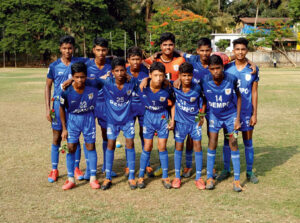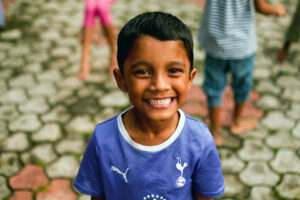The sun is beating down on the grass pitch. A group of young pre-teen girls stand in a circle. They are wearing jerseys bearing the marks of premier European football clubs – Manchester United, Everton, Liverpool. Bare feet, they work a football on the grass, passing it to each other in turns.
“Good!” shouts out one of two women at the centre of the group, “now let’s try throw-ins.”
The girls switch regimes and practice overhead throws.
Caroline and Rosie are in Goa as volunteers at El Shaddai. Caroline, an athletic woman in her thirties from England, was looking for something to do that would make some difference. She went online on the Indigo Volunteers website. Seven weeks later, she was on a plane to India. That was in November last year. She is back after two months, this time for five weeks of volunteering.
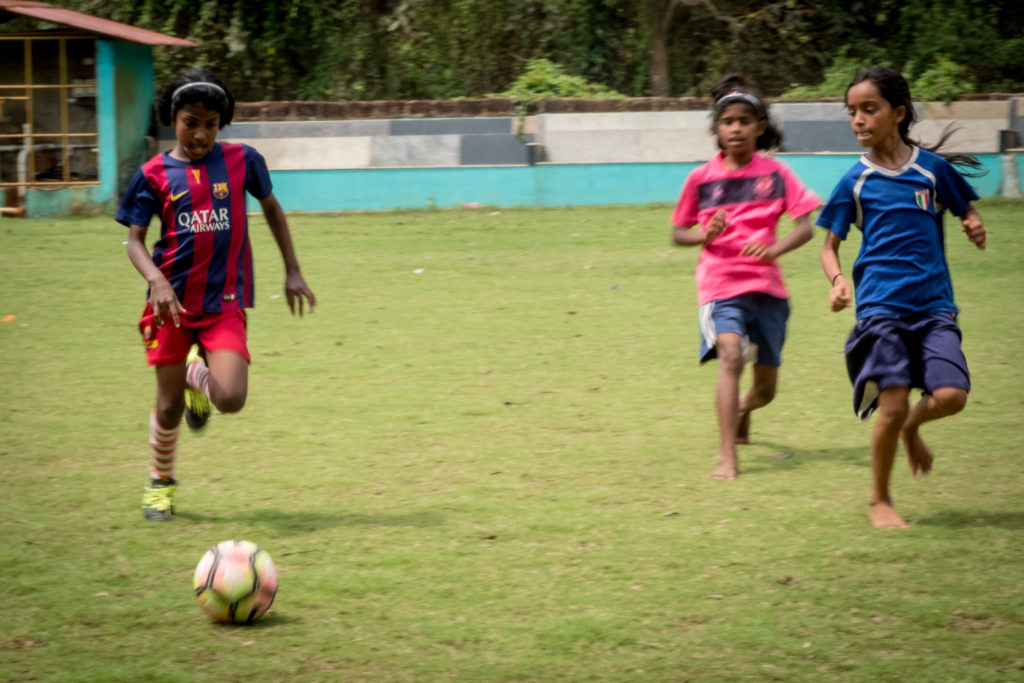
The practice session has given way to game time. The girls have divided themselves into two teams. They are an excited lively bunch. Pushpanjali, 13, is at the front of the attack.
“I like to play as the striker,” she told me at the halftime break.
The youngest and shyest of the group is nine-year-old Suhani. A wry smile on her face she says she likes to play football.
I asked her if she had any football role models.
“Yes!” she replied, “Rosie and Caroline!”
Rosie is in her gap year and wanted to explore volunteering opportunities in football coaching. Towering over the girls, Rosie, sporting pig tails in her hair, has played with English clubs like York City and currently Huntington. That’s when, like Caroline, she found El Shaddai on the Indigo Volunteers website.
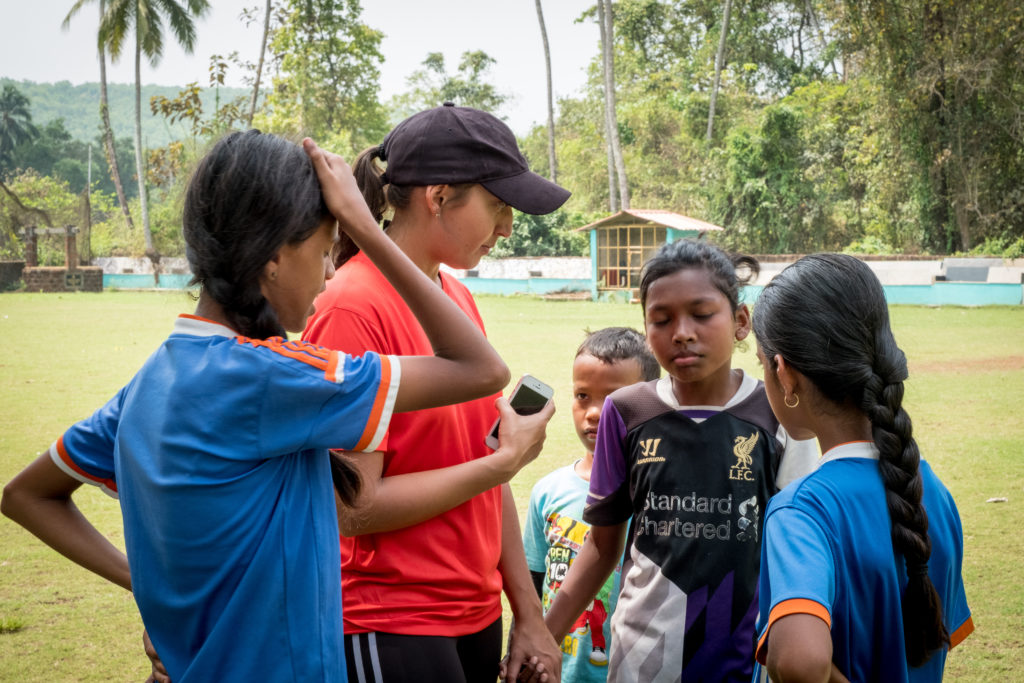
On the field, the girls are engrossed in the game. Pushpa is very much the striker she says she is, dominating play. She takes a free kick outside the eighteen-yard box. It’s a power strike, but straight to the keeper who gloves it off.
“Try to catch the ball the next time,” says Rosie to the keeper, “get your body behind the ball.”
Suhani comes alive on the field. Gone is the small, shy girl. She’s out tackling for ball possession. When she manages to get it, she strikes with force.
Rosie blows the whistle signalling the end of play, and the girls make their way to the sideline. She pulls out a packet of sweets and distributes it to the tired girls. It’s not a lot, but there are smiles all around.
“I’m ready for more,” says ten-year-old Reema. “I’m not tired when I play. I only get tired when doing the exercises.”
Reema, sporting a Liverpool jersey likes to play in the defence. She’s strong and can block an attacking striker well. The girls are excited about the England France World Cup match Rosie and Caroline showed them on YouTube.
In November when Caroline first volunteered at El Shaddai, the girls’ football coaching had just commenced. “Here I am two months later, and these girls are up there,” she says. “If they can do so much in such a short time, think what they could achieve in the future.”
“Hearing the stories of the children,” says Rosie, “I’m amazed at how they stay so positive even though they may not be in a good situation.”
With the summer holidays coming up, most of the children will head home. But some will stay back.
“Some of the kids get left behind,” says Caroline, “It’s heartbreaking to think that they don’t have anywhere and anyone to go to.”
She plans to arrange a dance summer camp for the children still in the homes before she leaves for England.
“I could have been one of these children,” she says, “I just got lucky.”
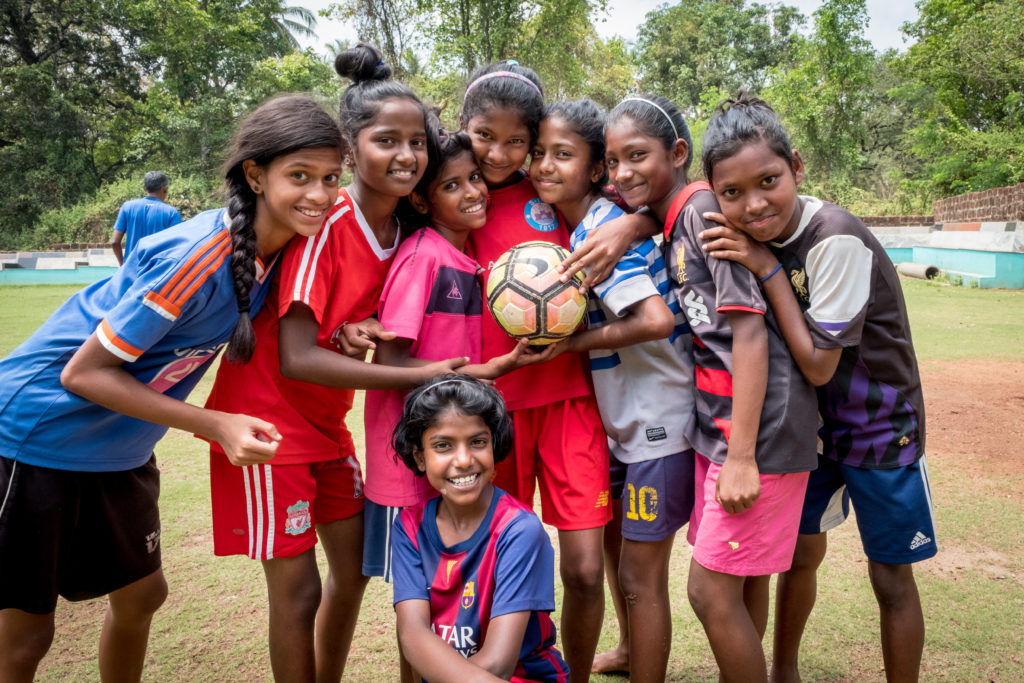
Caroline’s mother was diagnosed with Alzheimer’s, and Caroline had spent her time caring for her. When her mother was shifted into specialised care, Caroline found herself alone, with time on her hands.
“My mum and dad are half Indian – they are Anglo-Indian, but I never got to come to India,” she says. “I’ve wanted to come with my mother and was putting it off because of her illness. But then I decided she’d be proud of what want to do.”
Volunteering is a richly life-changing experience for most who decide to do it. Last year after a few weeks volunteering, when Caroline got back home to England in time for Christmas, she was angry. In India, Caroline had helped raise funds for gifts for the children, and she knew every child would get just one present.
“I knew the children would appreciate it – having that one gift to open,” she says.
Back home she saw kids in England had so much – duplicates of presents, stuff they probably wouldn’t even play with and all the waste of food.
“It does change you. It took me a while after going back,” says Caroline, “I will never be the same again. It does change you.”
Rosie and Caroline both understand that even something small – like spending time with the children, can make a big difference.
“I’m going to be more grateful for the little things,” says Rosie. “Sometimes, we take a lot for granted.”
Caroline adds, “It makes you realise you don’t need a lot to be happy. If these kids can be happy with nothing, apart from what people are gifting, why are we so greedy as a society to think we need all this stuff – when we don’t.”
A group of girls, foreheads dripping with sweat after the game of football under the tropical summer sun, gathers around Rosie and Caroline. Rosie whips out her i-phone on a selfie stick.
“They’ll always have me as a supporter now,” says Caroline. “They’ll have my heart.”
“Cheese!” the girls shout.
Snap!

